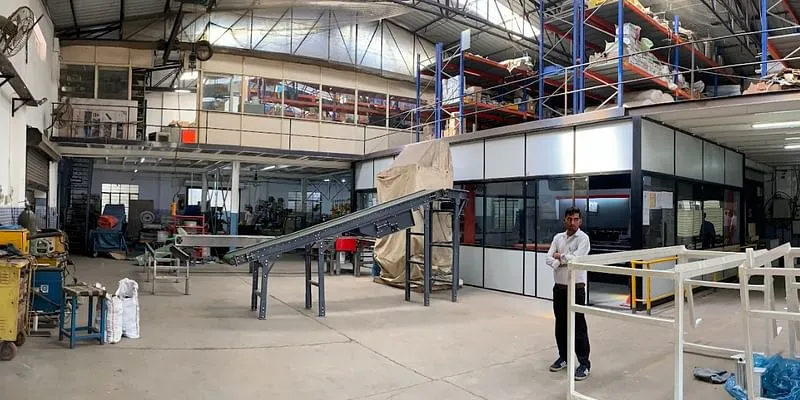This father-son duo is tapping the ecommerce wave to win over the warehouse automation solutions sector
From manufacturing conveyors to entering the warehouse automation segment, Faridabad-based Saifi Con Fab Systems has had quite a journey. In a conversation with SMBStory, second-generation entrepreneur Faraz Alam highlights how he and his father aim to make the company a key player in this segment.
With the onset of COVID-19, businesses have realised that they cannot go on as they wish to without leveraging technology. The pandemic has accelerated the pace at which businesses, especially SMBs, are adopting technology.
This also means that India is ushering in a ‘new industrial revolution’ that will be defined by the use of technologies like IoT, connectivity, artificial intelligence, machine learning, automation, advanced engineering, and much more.
SMBStory recently spoke to Faraz Alam, Co-founder of Atmos Systems, and Business Development Head of Saifi Con Fab Systems.
Faridabad-based was started by his father Khursheed Alam in 1987. From a simple material manufacturing company to making conveyors, Saifi has scaled quite a bit in the last 35 odd years. It has also been witness to the evolving manufacturing and warehouse ecosystem of India.
One of the newest trends to have strongly emerged in the Indian manufacturing industry is warehouse automation, a market that is exhibiting significant growth owing to the growing need for a cost-effective method of production.
Keeping up with this trend, Saifi launched a smart automation solutions provider brand, Atmos Systems, in 2020.
In a conversation with SMBStory, Faraz takes us through Saifi’s journey and what led to the launch of Atmos.
The beginning
Khursheed Alam, who was earlier working with shoe-manufacturing giant Bata, left the job in 1987 after a clash with his manager and decided to start his own business.
He began by using his lathe machine for manufacturing machine parts of shoe making machines, and continued this till about 1997 after which he started scouting for other opportunities in the market. And he did tread on one of the major gaps in the Indian manufacturing sector.
India at the time was in dire need of better technology and equipments, especially given the opening up of the its economy in 1991, when domestic companies had to compete with international giants who had entered the market. One of the needs identified then was conveyors- a mechanical strip of metal used for transporting objects from one place to another.
Khursheed saw that there weren’t many conveyor-manufacturers in India and the companies who needed them had to import them, leading to an increase in the cost of production. That is when he decided to shift to the manufacturing of conveyors. After doing a lot of research, he introduced several other types of conveyors including storage overhead conveyors, floor conveyors, I-Beam overhead conveyors and more.
Faraz recalls that for the first 10 years, word of mouth was the only form of marketing Khursheed adopted to scale up the business. Gradually, as the internet boom entered India, he launched his own website and got listed on B2B platforms such as IndiaMART to boost sales.
The business started taking off as players like Bajaj, Relaxo, Godrej, Eicher, Videocon, JBM, and more came on board as its customers. Then, in 2004, Khursheed shifted to a bigger factory in Faridabad and established two more units in the following years.

Saifi Con Fab Systems has three manufacturing units in Faridabad
Entering the warehouse automation segment
The decade between 2010 to 2015 saw an unprecedented rise in ecommerce. According to several reports, India has the largest customer base of online shoppers after China and the US.
As online delivery started gaining momentum in the Indian market, the trend did not go unnoticeable in the eyes of Khursheed Alam who was joined by his son, Faraz Alam, in 2018.
“Ecommerce companies have realised that they cannot decrease the time it takes to deliver products from a warehouse to a person’s home, so they have no choice but to make warehouse operations as seamless and productive as possible,” Faraz says.
In 2018, Khursheed and Faraz started developing a separate brand that focused only on smart warehouse automation solutions. The research and development took two years and finally, in 2020, the father-son duo launched Atmos Systems.
According to a report by Mordor Intelligence, the Indian warehouse automation market was valued at $86.2 million in 2020 and is slated to reach $512.2 million by 2026 at a CAGR of 26.4 percent in the forecast period.
Some of the major players in this market are Daifuku India Private Limited, Armstrong Limited, Space Magnum Limited, and more. Ecommerce giant, Amazon, also announced the infusion of $5 billion to set up automated warehouses in India.
The business model
Atmos Systems provides turnkey warehousing solutions using technologies like Internet of Things, automation and more.
Atmos first identifies the specific warehousing needs of a company, then starts working on creating the right solution including smart conveyors and software solutions which takes about 15 days to complete. Once everything is in place, it conducts trials before presenting the same to the client.
Under its brand, Atmos provides solutions such as Autonomous Case-Handling Robotic System for intelligent picking and handling of objects and Robotic Palletising System, which is used for transporting heavy objects from one place to another using pallets.
The Dimensioning Weighing Scanning (DWS) System is an ideal product for automatic capturing of product dimensions and weight. The Sortation Systems provide accuracy in sorting products based on defined attributes, claims Faraz
Atmos onboarded as its first client and today also has big groups like Escorts, Hero, and Onida in its kitty. The starting cost of a project is typically Rs 50 lakh and goes up till Rs 10 crore, including installation and packaging costs, Faraz says.
Atmos also gives its customers a one-year warranty, and deploys some of its technicians to work alongside these companies for the first few months so the clients can get a hang of the machines and the systems.
Atmos has so far clocked Rs 10 crore revenue since inception. Faraz says the father-son duo aim to make Atmos a top warehouse solutions provider in the years to come.
Edited by Anju Narayanan









